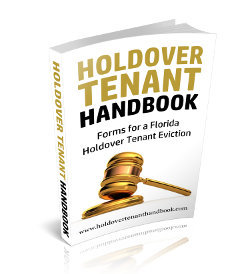One source of confusion among Florida Landlords is whether a 3-Day notice is required as a per-requisite for a holdover eviction. The short answer is “No.”
Click here to purchase the Holdover Tenant Eviction Forms Pack.
A 3-Day notice is typically not a prerequisite to filing a holdover eviction if you are seeking possession only (ie, not a money judgment for back rent, in addition to a judgment of possession removing the tenants from the property).
However, that does not mean that you can file a holdover eviction lawsuit without notice.
If the lease is a month-to-month or some other form of “at will” tenancy (such as a week to week lease), then the lease needs to be properly terminated with written notice. If there is a written lease, then any notice provisions in the lease need to be adhered to. However, if there are no notice provisions, or if this is an oral month-to-month lease, then 15-days written notice prior to the rent being due is adequate. The notice should be served by hand delivery or posting on the premises (ideally, by a process server). Florida Statute 83.57 is the statute that controls here.
If the lease is a written lease for a specific term, then it is still a good idea to provide plenty of notice to the tenant that the lease will not be renewed and that they have to leave at the end of the lease. There is no hard and fast rule as to when the notice needs to be provided, but a good rule of thumb is to provide notice at least 30 days prior to the end of the lease. If the landlord can provide more notice (45-60 days) then that is even better. The more notice you provide the tenant, the more likely it is that they will be able to make arrangements to leave at the end of their tenancy and avoid a holdover situation.
The idea is to provide your tenant with as much notice as practically possible that the lease will not be renewed. This makes the paper trail very clear to all the parties (and most importantly, the judge).
When it Makes Sense to File a Holdover 3-Day Notice
If you have a holdover situation, and want to sue for double rent, then a holdover 3-day notice is required. In most cases, chasing down residential tenants for back rent is more trouble than it is worth, but sometimes it makes sense to do so.
And sometimes it makes sense to serve a holdover 3-day notice even if you are not pursuing back rent. It can be one final “shot over the bow” to try to get the tenant to leave prior to filing the holdover eviction lawsuit. Whether it makes sense to do this depends on your timeline. Serving an otherwise unnecessary 3-day holdover eviction notice will add a minimum of 3 business days on to your eviction timeline. In the property rental business, time is money and it often doesn’t make sense to delay proceedings further by serving a 3-day. But if the landlord has the luxury of a little time, then it won’t otherwise hurt to serve these kinds of notices.
Click here to purchase the Holdover Tenant Eviction Forms Pack.
